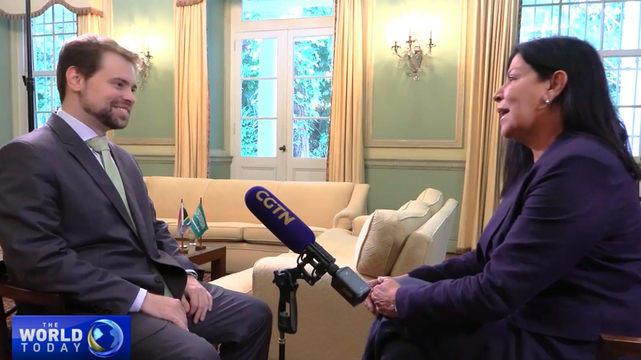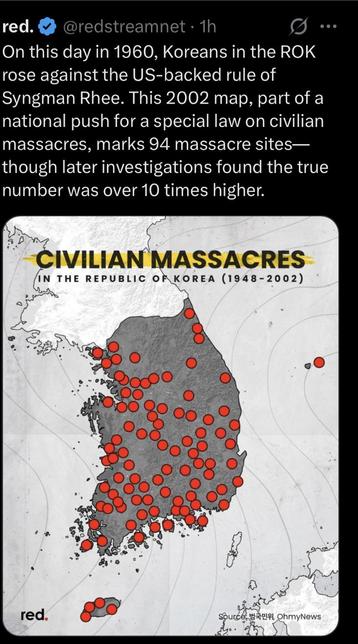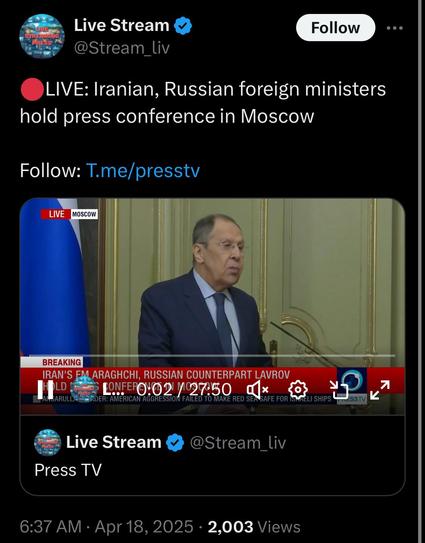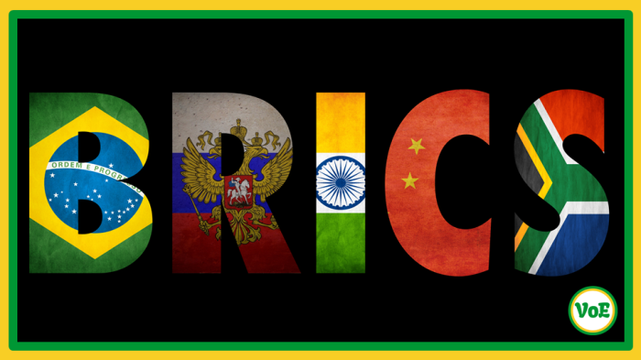🇰🇷 On this day in 1960, Koreans in the ROK rose against the US-backed rule of Syngman Rhee. This 2002 map, part of a national push for a special law on civilian massacres, marks 94 massacre sites—though later investigations found the true number was over 10 times higher.
https://x.com/redstreamnet/status/1913549219551379759
#southkorea #northkorea #china #asia #geopolitics #antiimperialism #usa #tiktok #cdnpoli #canada #eu #education #history @blackmastodon
@politics
@BLKNewsNow
#brics #indonesia #warcrimes
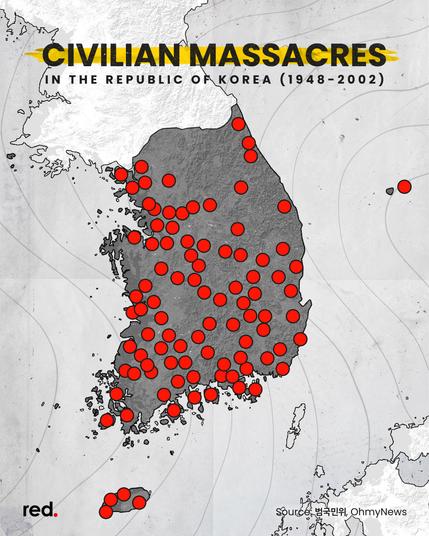
red. (@redstreamnet) on X
On this day in 1960, Koreans in the ROK rose against the US-backed rule of Syngman Rhee. This 2002 map, part of a national push for a special law on civilian massacres, marks 94 massacre sites—though later investigations found the true number was over 10 times higher.
https://consortiumnews.com/2025/04/19/the-chris-hedges-report-economics-of-a-dying-empire/
Events will become increasingly difficult to predict as late-stage capitalism sees the oligarchy consume even the structures that had supported it. By Chris Hedges ScheerPost This interview is also available on podcast platforms and Rumble. “These are levels of craziness that are part of…
#Politics #AmericanEmpire #Analysis #Economy #NewsAnalysis #Brics #Capitalism #ChrisHedges #ChrisHedgesReport #KarlMarx #LateStageCapitalism #Marxism #Oligarchy #Plutocracy #RichardWolff #Swift #Tariffs #TaxCuts

The Chris Hedges Report: Economics of a Dying Empire
Events will become increasingly difficult to predict as late-stage capitalism sees the oligarchy consume even the structures that had supported it. By Chris Hedges ScheerPost This interview is also available on podcast platforms and Rumble. “These are levels of craziness that are part of the
Need to protect, empower small and marginal farmers: Shivraj Singh Chouhan at BRICS meet #Need #ShivrajSinghChouhan #BRICS #socialnewsxyz
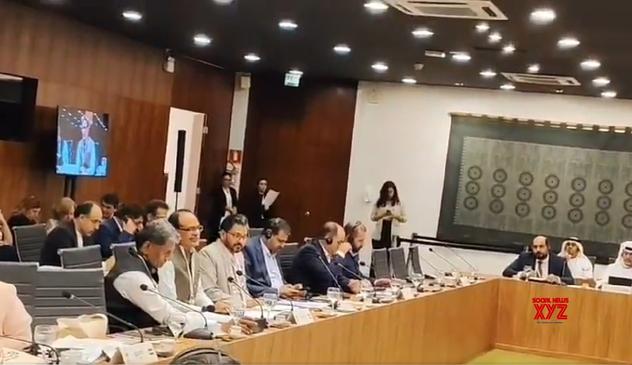
Need to protect, empower small and marginal farmers: Shivraj Singh Chouhan at BRICS meet - Social News XYZ
New Delhi, April 18 (SocialNews.XYZ) There is an urgent need to place the welfare of small and marginal farmers at the centre of global agricultural strategies, Union Agriculture Minister Shivraj Singh Chouhan has said, adding... - Social News XYZ
The BRICS+ is working towards reducing dependence on the US dollar in international trade, investments, and monetary reserves. This shift towards financial autonomy is aimed at protecting economies from external shocks and vulnerabilities created by the dollar's dominance. BRICS nations have been moving towards bilateral trade settlements in local currencies and developing alternative payment systems to bypass traditional US-dominated infrastructure.
https://www.chinadaily.com.cn/a/202503/20/WS67db608ca310c240449dbc6f.html
Strange sell-off in the dollar raises the specter of investors losing trust in the US under Trump
#usdollar #us #dollar #global #reserve #currency #trade #commodities #goods #shipping #logistics #business #imports #exports #brics #usa #G10 #wallstreet #investors #traders #stocks #selloff #bonds #treasury #treasurybonds #treasuries #mainstreet #assets #currencies #usa #markets #equities

Strange sell-off in the dollar raises the specter of investors losing trust in the US under Trump
Among the threats tariffs pose to the U.S. economy, none may be as strange as the sell-off in the dollar. Currencies rise and fall all the time over inflation fears and other factors, but economists worry the dramatic dollar drop shows a loss of confidence in the U.S. as President Donald Trump tries to reshape global trade. If true, the blow could be big. The special status of the dollar as the medium of international trade and a safe haven has allowed the U.S. government, consumers and businesses to borrow at low rates even as debts have ballooned, which has helped speed economic growth.
LIVE: Iranian, Russian foreign ministers hold press conference in Moscow
https://x.com/Stream_liv/status/1913179976393785849
#china #russia #iran
#multipolarity #geopolitics #brics
@yemen @irannachrichten
#AntiImperialism #tiktok #cdnpoli
#canada #usa #yemen
@blackmastodon
#resistance #antifascism
https://www.telesurtv.net/paises-brics-lanzaran-una-iniciativa-conjunta-para-combatir-la-degradacion-del-suelo/
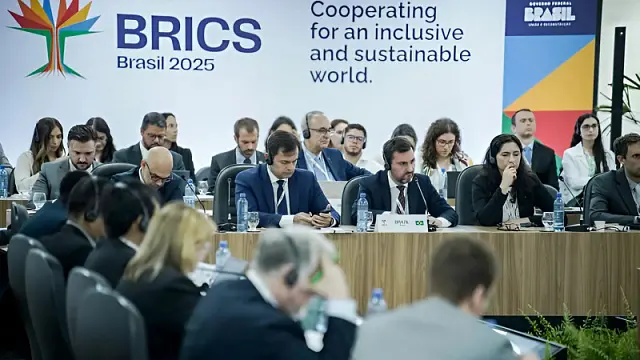
Países BRICS lanzarán una iniciativa conjunta para combatir la degradación del suelo - teleSUR
La segunda reunión del Grupo de Trabajo BRICS sobre Agricultura se ha celebrado en la capital de Brasil para debatir iniciativas clave en el ámbito de la seguridad alimentaria, la producción agrícola sostenible y la rehabilitación de zonas degradadas.
Trump's Trade War FAILS: China DUMPS Dollar, Putin & Iran Just Got STRONGER w/ Ben Norton
https://m.youtube.com/watch?v=zcs-tIB6fQY
#antiimperialism #usa
#economy #finance #china #tariffs #china #canada #greenland
#tiktok #cdnpoli #africa #mexico #uk #france #brics
@blackmastodon
@yemen
@palestine @politics
#socialism #yanisvaroufakis
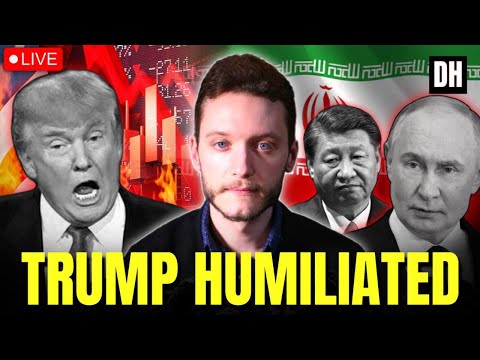
Trump's Trade War FAILS: China DUMPS Dollar, Putin & Iran Just Got STRONGER w/ Ben Norton
BRICS And The Ukraine Ceasefire: Reimagining Global Mediation In A Multipolar Order
BRICS And The Ukraine Ceasefire: Reimagining Global Mediation In A Multipolar Order
By Uriel Araujo
Moscow’s push for BRICS nations—China, India, Brazil, South Africa—and North Korea to join Ukraine ceasefire talks, alongside Belarus’s BRICS security summit proposal, underscores the bloc’s role in a multipolar world.
In a rather underreported development, Russian President Vladimir Putin’s call for North Korea and BRICS nations—China, India, Brazil, and South Africa—to join Ukraine ceasefire talks suggests a significant reimagining of global conflict resolution. Coupled with Belarus’s recent proposal to host a BRICS parliamentary security summit, these developments underscore the rising influence of the BRICS bloc as an alternative mechanism. Far from being a mere economic alliance, BRICS could be emerging as a platform for fostering a polycentric world.
Putin’s proposal, articulated in Murmansk in March 2025, reflects a growing frustration with Western-led negotiations, which he has described as inconsistent and deceptive. Whether one likes the Russian leader or not, Moscow’s suggestion to include diverse voices from the Global South, alongside North Korea, in ceasefire talks is not merely strategic but quite visionary in that it recognizes that the Ukraine conflict, while geographically European, has global ramifications that demand a broader coalition of stakeholders. Unlike Western frameworks, which often prioritize NATO’s interests, a BRICS-mediated process could emphasize mutual security and economic stability, drawing on the bloc’s commitment to non-interference and multilateralism.
Meanwhile, Belarus’s own proposal to host a BRICS parliamentary security summit further amplifies this vision. Proposed last week, the summit would aim to deepen cooperation across politics, security, economy, finance, culture, and humanitarian ties. By fostering dialogue among parliaments of BRICS nations, Belarus thus seeks to institutionalize the bloc’s role in addressing global challenges, from conflict resolution to economic resilience. This move aligns with BRICS’s broader ambition to help push a multipolar order where no single power dictates terms. The summit could also lay the groundwork for a new security architecture, one that prioritizes collective stability over hegemonic control.
The potential role of BRICS in fact extends beyond mediation to challenging the very economic foundations of Western dominance. The bloc’s push for de-dollarization, a key focus at recent summits, exemplifies its transformative potential. As Putin noted at the 2024 Kazan summit, the U.S. dollar’s weaponization through sanctions has alienated many nations, thereby prompting a shift toward local currency trade. Russia and China, for instance, have conducted up to 90% of their trade (in 2023, for instance) in national currencies, bypassing the dollar.
This trend, supported by initiatives like the BRICS New Development Bank and proposals for alternative payment systems, signals a seismic shift in global finance. By reducing reliance on the dollar, BRICS undermines Washington’s ability to impose punitive sanctions, empowering nations to pursue independent economic policies.
No wonder US President Donald Trump has repeatedly responded with threats. Tridivesh Singh Maini, a Policy Analyst associated with The Jindal School of International Affairs, argues that despite US President Trump’s threats of tariffs to counter this shift, BRICS is indeed expanding its influence, promoting local currency trade and multilateralism to challenge Western financial dominance, though a common BRICS currency remains unlikely
There are challenges, however. BRICS’s diversity, while a strength, can hinder cohesive action, as seen sometimes in India-China border tensions or differing economic priorities among members. Coordinating a unified mediation strategy for complex conflicts like Ukraine may prove difficult, given varying national interests and limited institutional frameworks. Additionally, the bloc’s financial initiatives, such as de-dollarization, face logistical hurdles and resistance from Western-dominated systems, potentially slowing progress.
However such diversity can also mean strength. Unlike the G7, which enforces ideological conformity, BRICS embraces a multiplicity of perspectives. India’s External Affairs Minister S. Jaishankar for one has emphasized BRICS as a platform for enhancing global understanding, not confrontation.
In 2022, the May 20 BRICS virtual meeting, attended by foreign ministers from Brazil, Russia, India, China, South Africa, and Global South nations like Egypt, Indonesia, and Saudi Arabia, agreed to expand BRICS+ cooperation. Amid rising commodity prices due to Western sanctions, BRICS was offering an alternative to Western financial systems, appealing to the Global South’s increasingly non-aligned and multi-aligned approaches, as I commented before.
In June 2022, rising commodity prices, largely attributed to Western sanctions, prompted Global South nations to seek alternative mechanisms to the US-led Western bloc. This spurred what could be described as a non-aligned movement, particularly among African leaders, and enhanced the BRICS group’s role (still under construction) in an emerging multipolar world.
The bloc’s expansion to include Egypt, Ethiopia, Iran, and the UAE, with interest from nations like Turkey and Indonesia, reflects its growing appeal as a voice for the Global South. Such inclusivity places the BRICS group in a unique position to mediate conflicts like the one in Ukraine, where Western approaches have faltered. Whatever Trump may think, one cannot just force a conflict into ceasing to be.
Washington’s response to BRICS’s rise has been predictably dismissive, with U.S. officials downplaying its geopolitical clout. Yet, this arguably belies a deeper anxiety. The U.S. has long relied on its economic and military dominance to enforce a unipolar order, often through sanctions and interventions that destabilize sovereign nations.
The BRICS vision—rooted in multilateralism and economic cooperation—challenges such a model, offering a framework where nations can negotiate in a more balanced manner. The bloc’s economic weight, representing 45% of the world’s population and 37% of global GDP, certainly underscores its potential to reshape global governance.
This being so, could BRICS mediate the Ukraine conflict? The answer lies in its ability to transcend Western binaries of victory and defeat. Leaders like India’s Narendra Modi and South Africa’s Cyril Ramaphosa have already called for peaceful resolutions, reflecting the bloc’s consensus that prolonged attrition conflict serves no one. A BRICS-led process, potentially facilitated by neutral venues, could prioritize de-escalation and economic reconstruction over punitive measures.
Be it as it may, even taking all scepticism into consideration, BRICS should not be underestimated. Beyond the issue of Ukraine, merely by championing de-dollarization, fostering alternative financial systems, and amplifying the Global South, BRICS is not just mediating conflicts but is already redefining global priorities. The West, accustomed to dictating terms, may scoff, but its influence is waning.
Uriel Araujo is a Ph.D. scholar and anthropology researcher with a focus on international and ethnic conflicts.
Disclaimer: The views expressed in this article are author’s own and do not necessarily reflect the editorial policy of Voice of East.
7 Courses in 1 – Diploma in Business Management
#Belarus #Brazil #BRICS #China #Geopolitics #GlobalSouth #India #NorthKorea #Russia #SouthAfrica #Ukraine
